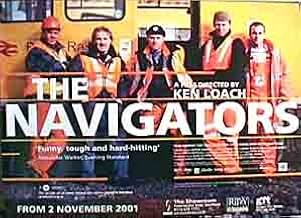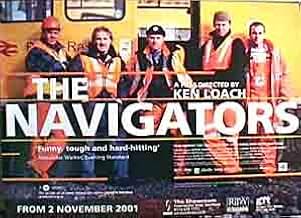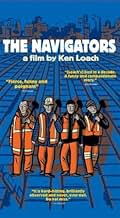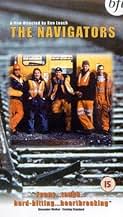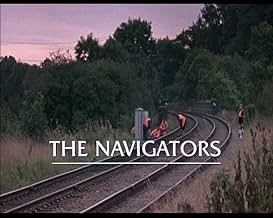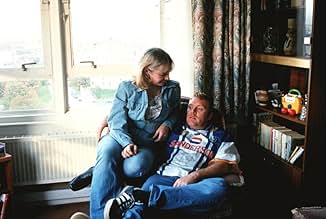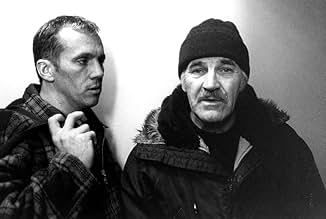IMDb RATING
7.0/10
3.2K
YOUR RATING
Five Yorkshiremen try to survive after the British Rail is bought out by a private company.Five Yorkshiremen try to survive after the British Rail is bought out by a private company.Five Yorkshiremen try to survive after the British Rail is bought out by a private company.
- Won 1 BAFTA Award
- 3 wins & 3 nominations total
Thomas Craig
- Mick
- (as Tom Craig)
Angela Forrest
- Tracy
- (as Angela Saville)
- Director
- Writer
- All cast & crew
- Production, box office & more at IMDbPro
Storyline
Did you know
- GoofsThe vest that John wears in the beginning (with the meter) and end (their last job), is actually a British Rail safety vest, over his Gilchrist coat (when he moves you can see the gray on it). He has the combination on before the company is renamed Gilchrist Engineering.
- ConnectionsReferenced in Il était une fois...: Moi, Daniel Blake (2021)
Featured review
England. Mid 1990's. British Rail has been privatised and broken up into separate companies with all work put out to tender with the lowest bidder getting the job. This film follows a group of workers in a Yorkshire depot as the culture gradually changes from a world of union influence into a competitive business world.
This is a very sobering film - it deals with the railtrack situation but is more generally about the selling out of the working man and the beginning of the culture that views people as commodities and expenses, just like the rolling stock and the rails. The film opens with the boss of the depot announcing that the company has been privatised and that things will begin to change. It then follows the culture change over the course of time and concludes with a depressingly innocuous exchange that represents the shattering of previously unified spirits.
The culture change beings with mission statements, competing with work and setting levels for "acceptable deaths and continues with an end to previous agreements and a range of different companies. It is very hard to watch without being angry at the treatment of previously proud men as they are reduced to being costs. Workers are offered voluntary redundancy and those that refuse are gradually forced out. Bosses and chief execs identify those workers that have union ties and work to push them out. Workers are encouraged to join temp agencies at higher wages but without benefits or a steady work load thus saving the company money. Those that make trouble with the crews by insisting on safe working conditions etc are blackballed by the agencies and no more work is put their way. The pressure to cut costs to win jobs continues until unskilled workers are used for rail maintenance because they are paid cash in hand while other crews are forced to use "cost-effective" methods to work without a lookout and run the risk of severe accidents.
For those who think that the experiences of the workers are exaggerated for effect, Ken Loach received regular visits from railtrack workers (taking holidays or sick days) to advise on the film to make sure that it was representative of their experiences - they couldn't officially do it as they feared being blacklisted within the company. These things do go on - the rail companies are led by bosses who get huge bonuses from the shareholders as they drive down operating costs by compromising safety and reducing the workforce costs.
If the film has a major flaw it is the one-sided nature of the script. Workers are all represented as jovial, hardworking types, you know - salt of the earth, put down by bosses who only care about money. The latter may well be true but the way the workers constantly joke etc makes them look too good and the film has far too much sympathy for them for it's own good. Even when a group of workers do something completely abhorrent (the end of the film) it is presented as something that they had no choice about whereas really they should have carried some of the blame.
This film was released in Europe but only had a limited release in the UK as it was screened first on TV. It came shortly after the collapse of Railtrack as the Government put it into administration. It was screened days after the Government tried to cover up a report of failing train performances etc and it was screened as inquiries continue into serious derailments with significant loss of life.
In the UK one major accident killed many passengers and was put down to badly maintained rails. The Chief Exec has thus far escaped charges of manslaughter (despite the findings of the Health & Safety Executive) and also left his job with his huge contractually-obliged bonus, before moving on to another job on another board. For those who think that this film is exaggerated you truly have no idea what's going on in the world of big business.
As the Government continue plans for part privatisation of the London Underground and have further plans to privatise air traffic control this film is a very scary thing. Once we forget the people who make up workforces that only leave numbers. When shareholders become more important than the public and the workers then costs are all that matters and all corners are cut to boost the share price.
This film has it's flaws and will not change Government policy one bit. But this is a very sobering film that will open you eyes to what is done to satisfy shareholders and earn bonuses for upper management.
This is a very sobering film - it deals with the railtrack situation but is more generally about the selling out of the working man and the beginning of the culture that views people as commodities and expenses, just like the rolling stock and the rails. The film opens with the boss of the depot announcing that the company has been privatised and that things will begin to change. It then follows the culture change over the course of time and concludes with a depressingly innocuous exchange that represents the shattering of previously unified spirits.
The culture change beings with mission statements, competing with work and setting levels for "acceptable deaths and continues with an end to previous agreements and a range of different companies. It is very hard to watch without being angry at the treatment of previously proud men as they are reduced to being costs. Workers are offered voluntary redundancy and those that refuse are gradually forced out. Bosses and chief execs identify those workers that have union ties and work to push them out. Workers are encouraged to join temp agencies at higher wages but without benefits or a steady work load thus saving the company money. Those that make trouble with the crews by insisting on safe working conditions etc are blackballed by the agencies and no more work is put their way. The pressure to cut costs to win jobs continues until unskilled workers are used for rail maintenance because they are paid cash in hand while other crews are forced to use "cost-effective" methods to work without a lookout and run the risk of severe accidents.
For those who think that the experiences of the workers are exaggerated for effect, Ken Loach received regular visits from railtrack workers (taking holidays or sick days) to advise on the film to make sure that it was representative of their experiences - they couldn't officially do it as they feared being blacklisted within the company. These things do go on - the rail companies are led by bosses who get huge bonuses from the shareholders as they drive down operating costs by compromising safety and reducing the workforce costs.
If the film has a major flaw it is the one-sided nature of the script. Workers are all represented as jovial, hardworking types, you know - salt of the earth, put down by bosses who only care about money. The latter may well be true but the way the workers constantly joke etc makes them look too good and the film has far too much sympathy for them for it's own good. Even when a group of workers do something completely abhorrent (the end of the film) it is presented as something that they had no choice about whereas really they should have carried some of the blame.
This film was released in Europe but only had a limited release in the UK as it was screened first on TV. It came shortly after the collapse of Railtrack as the Government put it into administration. It was screened days after the Government tried to cover up a report of failing train performances etc and it was screened as inquiries continue into serious derailments with significant loss of life.
In the UK one major accident killed many passengers and was put down to badly maintained rails. The Chief Exec has thus far escaped charges of manslaughter (despite the findings of the Health & Safety Executive) and also left his job with his huge contractually-obliged bonus, before moving on to another job on another board. For those who think that this film is exaggerated you truly have no idea what's going on in the world of big business.
As the Government continue plans for part privatisation of the London Underground and have further plans to privatise air traffic control this film is a very scary thing. Once we forget the people who make up workforces that only leave numbers. When shareholders become more important than the public and the workers then costs are all that matters and all corners are cut to boost the share price.
This film has it's flaws and will not change Government policy one bit. But this is a very sobering film that will open you eyes to what is done to satisfy shareholders and earn bonuses for upper management.
- bob the moo
- Dec 3, 2001
- Permalink
- How long is The Navigators?Powered by Alexa
Details
- Release date
- Countries of origin
- Official sites
- Language
- Also known as
- Demiryolcular
- Filming locations
- Production companies
- See more company credits at IMDbPro
Box office
- Gross US & Canada
- $3,052
- Opening weekend US & Canada
- $1,940
- Feb 23, 2003
- Gross worldwide
- $1,807,686
- Runtime1 hour 36 minutes
- Color
- Sound mix
- Aspect ratio
- 1.85 : 1
Contribute to this page
Suggest an edit or add missing content


